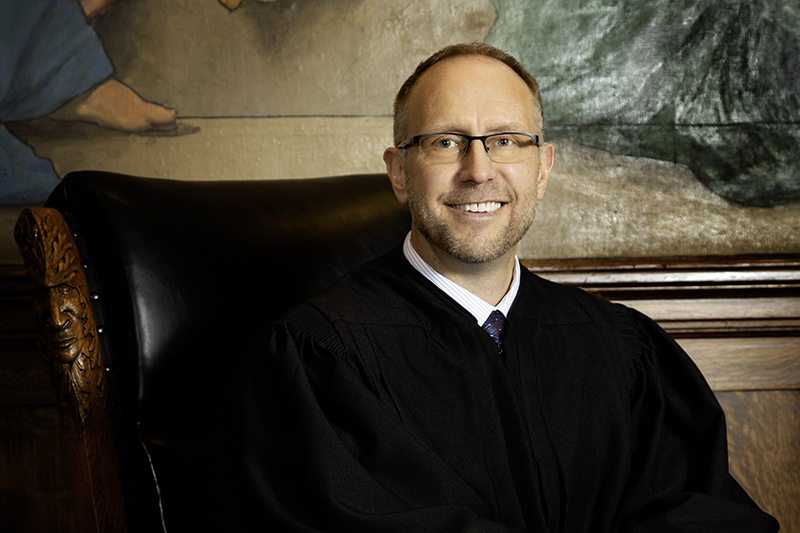Supreme Court allows same-sex parents to be listed on Indiana birth certificates
High court rejects Indiana AG Curtis Hill's challenge to appeals court decision in favor of lesbian couple

The U.S. Supreme Court has effectively upheld a lower court decision that allows both partners in a same-sex couples to be listed as their children’s parents on Indiana birth certificates.
The high court refused to hear a lawsuit over the issue, in which a legally married lesbian couple, Ashlee and Ruby Henderson, sued after being blocked from being listed on their son’s birth certificate.
Their son was conceived in 2015 through artificial insemination and carried to term by Ruby, but the state refused to allow Ashlee, as the non-biological parent, to be listed, instead saying that she would have to legally adopt the son she is helping to raise in order to have her parental rights acknowledged.
The Hendersons had argued in their lawsuit that leaving one parent’s name off the birth certificate would create complications when it came to issues like health insurance coverage, who could speak for a child at a doctor’s appointment, enrolling in school, or registering for intramural sports or summer camps.
They also charged that the lengthy adoption process, which could cost anywhere from $4,000 to $5,000, was costly and unnecessary, since the state could simply change its policy regarding parental recognition.
A federal court sided with the Hendersons in 2016, ruling Indiana’s policy refusing to list the non-biological parent to be unconstitutional.
The state appealed the ruling to the 7th U.S. Circuit Court of Appeals in Chicago, which, in January 2020, decided in favor of the Hendersons and seven other same-sex couples who signed on as plaintiffs.
The appeals court found that under a “presumption of parentage” statute, the spouse of a child’s biological parent (generally, the husband of the biological mother) is presumed to be the child’s second parent, in order to provide the child with greater legal protections.
As such, the 7th Circuit ruled, both partners in a same-sex couple should be listed as parents, regardless of their biological ties, ensuring they can enjoy the same rights that are bestowed on heterosexual parents.
In 2017, the U.S. Supreme Court found similarly in a case out of Arkansas, known as Pavan v. Smith, in which two lesbian couples sued over a state policy prohibiting the non-biological mother from being listed as a parent on the child’s birth certificate. But Indiana Attorney General Curtis Hill (R) appealed the 7th Circuit’s decision in the Hendersons’ case to the Supreme Court, hoping that the court — which has shifted rightward following the confirmations of Brett Kavanaugh and Amy Coney Barrett — would overturn its own precedent from the Pavan case.
In an op-ed published in the right-wing online magazine The Federalist, Hill decried headlines suggesting that Indiana’s policy was somehow “anti-gay” and arguing that the proper remedy is for the non-biological parent to go through a second-parent adoption.
“When a married woman gives birth in Indiana, her husband is presumed to be the biological father — barring any information to the contrary. Such a presumption of a child’s biological connection to both spouses obviously cannot be made when the birth mother is married to another woman,” Hill wrote.

“Anytime a child is adopted, the adoptive parent enjoys the same legal rights and interests associated with the child as a biological parent. Objections to Indiana’s fatherhood-presumption law ignore adoption as an available means to attain parenthood.
“Indiana’s law is built quite straightforwardly on the longstanding principle that both biological parents of a child have rights, obligations, and legal interests associated with the child that can be overcome only by judicial decree,” Hill continued. “The federal appeals court ruled that, because Indiana does not require a genetic test for every birth, our birth-certificate system is somehow based on marriage rather than biology. But why should states be forced into the unnecessary expense of requiring a DNA test for every newborn, even those born to a mother who does not doubt that her husband is the biological father?
“The great majority of the time, a birth mother’s husband is the baby’s biological father,” he concluded. “By adding unnecessary expense and warrantless intrusion into the privacy of the marriage, mandatory DNA tests for every child could create more problems, not fewer.”
See also: Study finds children of same-sex parents fare better in school
LGBTQ advocates cheered the high court’s decision, saying it not only kept in place the Pavan precedent but ensured that same-sex couples would enjoy the same rights and privileges as opposite-sex couples, a principle on which the Obergefell v. Hodges decision legalizing marriage equality was based.
“By declining Indiana’s petition, the Supreme Court affirmed Obergefell and the requirement that states must treat married same-sex couples equally,” Shannon Minter, the legal director of the National Center for Lesbian Rights, which represented the Hendersons and the other couples, said in a statement. “Marriage equality is and remains the law of the land.”
“We are so happy for our clients, and other same-sex parents and their children in Indiana, who can finally breathe a sigh of relief that they will continue to be recognized families on their children’s birth certificates,” NCLR Deputy Director and Family Law Director Cathy Sakimura said in a statement. “The Supreme Court rightly denied this case because it has already clearly decided that same-sex spouses and different-sex spouses must be treated equally.”
The Indiana Democratic Party celebrated the statement, while also taking a jab at Hill for attempting to overturn precedent.
“The U.S. Supreme Court has now made it clear to everyone that LGBTQ Hoosiers should have the same God-given privileges as everyone else, which includes having job security, getting married, and starting a family with the person they love,” Drew Anderson, a spokesman for the IDP said in a statement. “The Indiana GOP is still not long-removed from the days of Mike Pence and RFRA, and we suggest Hoosier Republicans get with the times and stop creating useless political theater that does nothing but destroys our trust and divides the state.”
Read more:
Four teachers suspended from New Jersey high school for anti-gay comments in Zoom chat
West Virginia Republican who resigned over anti-gay comments has been re-elected
Lesbian couple settles lawsuit with senior living community that rejected them
Support Metro Weekly’s Journalism
These are challenging times for news organizations. And yet it’s crucial we stay active and provide vital resources and information to both our local readers and the world. So won’t you please take a moment and consider supporting Metro Weekly with a membership? For as little as $5 a month, you can help ensure Metro Weekly magazine and MetroWeekly.com remain free, viable resources as we provide the best, most diverse, culturally-resonant LGBTQ coverage in both the D.C. region and around the world. Memberships come with exclusive perks and discounts, your own personal digital delivery of each week’s magazine (and an archive), access to our Member's Lounge when it launches this fall, and exclusive members-only items like Metro Weekly Membership Mugs and Tote Bags! Check out all our membership levels here and please join us today!


























You must be logged in to post a comment.